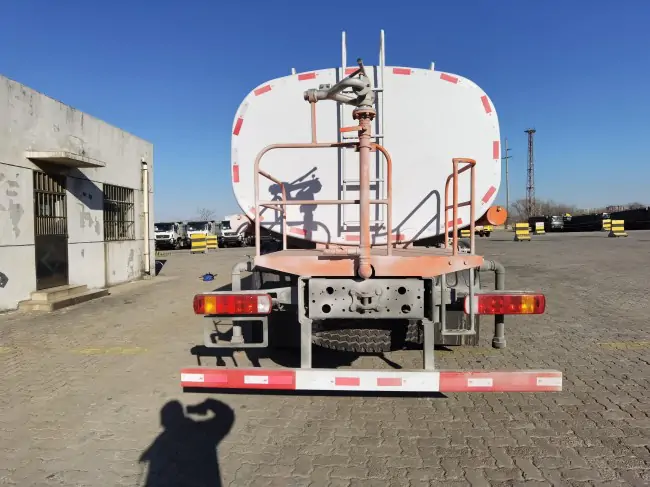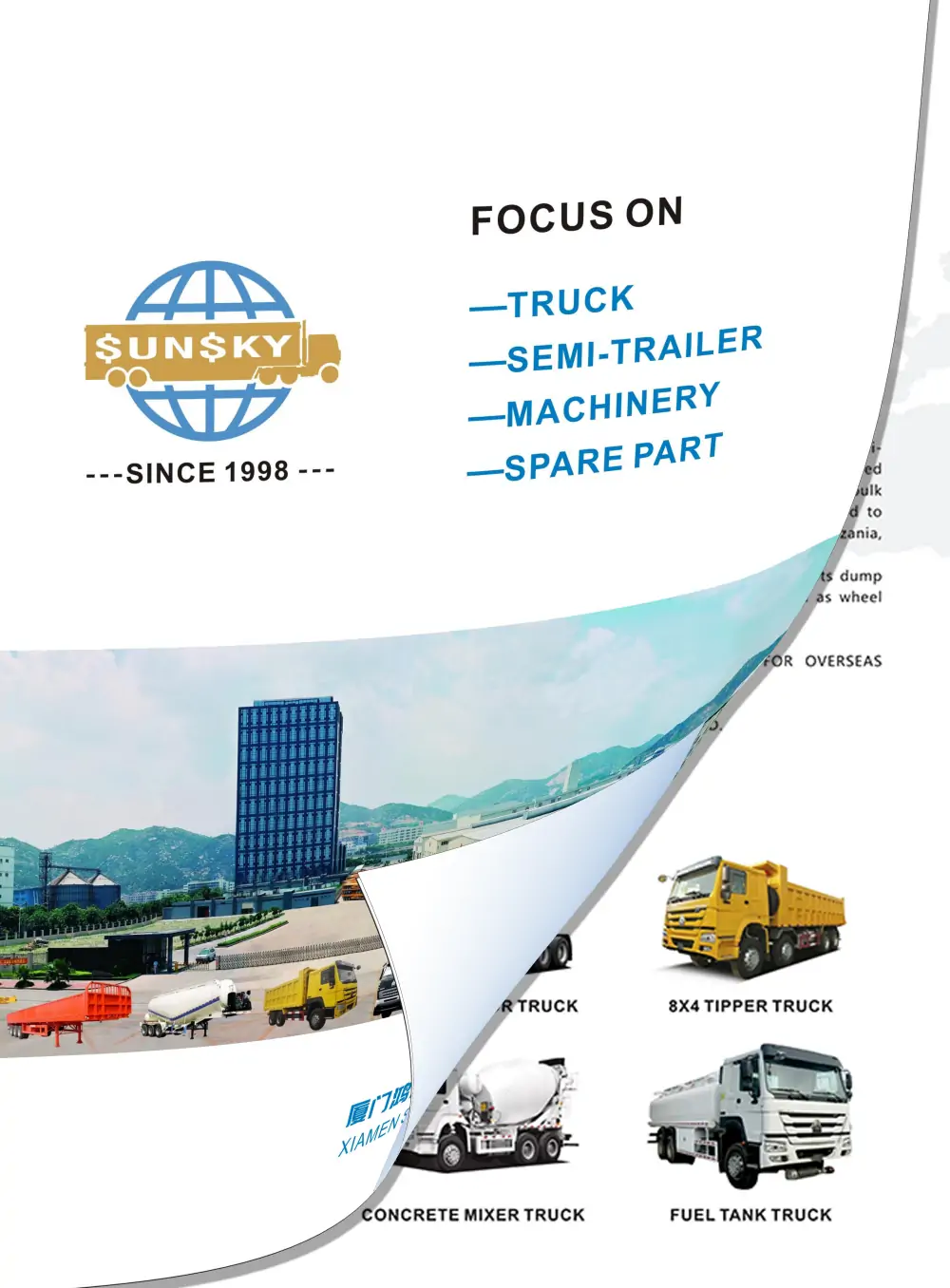Tank Trucks
Precision Engineering for Safe Bulk Liquid Transport. Our Tank Trucks are meticulously engineered for the secure, efficient, and compliant delivery of diverse bulk liquids, gases, and specialized materials, ensuring unmatched reliability for your critical transport needs.
Click HereType of Tank trucks

Fuel tank trucks are special vehicles designed to transport various refined oils and crude oils such as gasoline, diesel, kerosene, and aviation fuel.
Applicable scenarios:
Gas station distribution
Industrial and mining fuel supply
Aviation fuel transportation
Military and emergency reserves
Long-distance transportation

Watering trucks, also known as water trucks, are mainly used for transportation and spraying water. They are equipped with water pumps, spraying devices (such as front flushing, rear spraying, side spraying, and high-altitude cannons) and water pipelines, etc., and have various functions.
Applicable scenarios:
Municipal sanitation
Construction site dust reduction
Fire emergency
Drought relief
Landscaping
Road maintenance

A mixer truck is a special truck used to transport concrete. Its core component is a rotatable mixing drum that continuously stirs the concrete during transportation to prevent solidification, segregation, and water seepage, ensuring that the concrete remains uniform and plastic when it arrives at the construction site.
Applicable scenarios:
Construction site material supply
Urban infrastructure construction
Large-scale engineering projects
Ready-mixed concrete production and distribution
Request your tank trucks quote today
tank trucks Drive type
Tanker trucks are special vehicles used to transport liquid, gas or powdered bulk materials. According to the nature of the transported materials, there are strict requirements for tank design, materials and safety configuration to ensure safety, efficiency and environmental protection during transportation.

4x2 fuel tank truck

4x4 fuel tank truck

4x2 mixer truck

6x4 mixer truck

8x4 mixer truck

4x2 water bowser truck

6x4 water bowser truck

8x4 water bowser truck
Sunsky Container Trailers Advantage

Equipped with high-performance pumping and discharge systems, facilitating rapid loading and unloading for quicker turnarounds.

Advanced suspension and balanced weight distribution provide excellent road stability, crucial for volatile or heavy liquid transport.
Tank truck
Frequently asked questions
A Tank Truck, often referred to as a tanker or tank lorry, is a specialized commercial motor vehicle designed specifically for the safe and efficient transportation of bulk liquid, gaseous, or powdered materials. Unlike general cargo trucks, its core feature is an integrated, enclosed tank or cistern mounted on the chassis. Its primary function is to deliver large volumes of specific materials directly to their destination, ensuring minimal spillage, contamination, or exposure during transit, which is critical for industries handling fuels, chemicals, water, or bulk food products.
Tank trucks are highly versatile and can transport a wide array of bulk materials, tailored to the specific cargo's properties. This includes:
Fuels: Gasoline, diesel, kerosene, aviation fuel.
Chemicals: Acids, bases, solvents, industrial gases (liquid or compressed forms).
Food-grade Liquids: Milk, edible oils, sweeteners, liquid chocolate, alcoholic beverages.
Water: Potable water, non-potable water for construction, dust suppression, or firefighting support.
Construction Materials: Wet concrete (via mixer trucks), asphalt, cement powder.
Other Bulk Materials: Certain slurries, granular materials, or specific waste products. The tank material, lining, and safety features are always customized to the specific type and hazard level of the material being transported.
Tanker trucks are indispensable across numerous industries:
Energy Sector: Delivering fuel to gas stations, industrial sites, or remote operations; transporting crude oil from extraction sites.
Construction & Infrastructure: Supplying concrete to job sites (mixer trucks), transporting water for dust control (water bowsers), or delivering asphalt for road paving.
Environmental Services: Collecting and transporting waste liquids, wastewater, or chemicals.
Agriculture: Delivering liquid fertilizers or pesticides to farms, or transporting bulk milk from dairies.
Public Services: Municipal water bowser trucks for street cleaning, irrigation, and emergency water supply; specialized trucks for fire suppression or de-icing.
Industrial Supply: Providing bulk chemicals to manufacturing plants or carrying industrial gases.
Safety is paramount for liquid transport trucks, especially when handling hazardous materials. Key safety features include:
Robust Tank Construction: Tanks are built to stringent industry standards (e.g., DOT, ADR, ASME), often using high-strength steel or aluminum, with internal baffles to minimize sloshing.
Pressure and Vacuum Relief Valves: Essential for managing internal tank pressure variations caused by temperature changes or material off-gassing, preventing over-pressurization or vacuum collapse.
Emergency Shut-off Valves: Located remotely, these can instantly stop flow in case of an accident or spill.
Static Grounding Systems: To prevent static electricity buildup during loading/unloading, which can ignite flammable materials.
Roll-over Protection: Design features to maintain tank integrity in the event of a roll-over.
Advanced Braking & Stability Systems: Including ABS, ESC, and often specialized braking for heavy loads.
Compartmentalization: For multi-product transport, internal baffles or separate compartments prevent mixing and contamination.
Daily maintenance for a fuel tank truck is critical for operational safety and longevity:
Pre-Trip Inspections (DVIR): Checking tires, brakes, lights, fluid levels, steering, and ensuring all valves and connections are secure and leak-free.
Tank Integrity Check: Visually inspecting the tank for dents, cracks, corrosion, and verifying the condition of manhole covers, gaskets, and external piping.
Pump & Meter System Check: Ensuring the proper functioning of the pumping system, flow meters, hoses, and nozzles, looking for any signs of wear or leaks.
Safety Equipment: Verifying the presence and functionality of fire extinguishers, spill kits, grounding cables, and warning placards.
Cleanliness: Regularly cleaning the exterior and interior (if appropriate for the cargo type) to prevent contamination and corrosion.
Fluid Levels & Lubrication: Checking engine oil, coolant, hydraulic fluid, and lubricating chassis components as per manufacturer guidelines.
Pressure Relief Valve Checks: Although often on a less frequent schedule, regular verification of pressure relief valve functionality is crucial.
Regional regulations significantly influence tank truck design regarding dimensions, weight limits, and hazardous material classifications. Environmental standards drive innovation in emission controls, vapor recovery systems during loading/unloading, and spill prevention features. For instance, specific standards dictate tank wall thickness, valve types, and safety certifications (e.g., DOT in the US, ADR in Europe), ensuring each truck is purpose-built and compliant for its operating environment and cargo type.
Selecting the optimal tank truck capacity involves several factors to maximize efficiency and minimize costs. Key considerations include the average volume of material needed per delivery, the maximum payload allowed by local road regulations, and the available loading/unloading infrastructure at origin and destination points. Fuel consumption, maneuverability requirements for delivery sites, and the specific gravity of the material being transported also play crucial roles in determining the most economical and practical tank volume for your operational needs.
Connect with us
Ready to partner? We’re convinced Sunsky Vehicle is your best choice! Reach out through the form or by phone.

*Our team will answer your inquiries within 24 hours.
*Your information will be kept strictly confidential.












